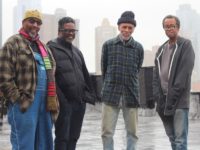Tufts University’s Distler Hall hosted quite an event the evening of April 5, 2017. Three fixtures of the New York Downtown improvised music scene joined on stage to sound off on “Art, Race, and Politics in America,” marked by hard, honest discussion, Q&A and some light moments. And then they channeled those emotions into music. Daniel Carter, William Parker and Matthew Shipp gave the audience their unfiltered thoughts both in words and music. AUM Fidelity captured all of the musical performance, and in May 2018 put it out to the public as Seraphic Light, Live at Tufts University.
Parker and Shipp are better known quantities in the world of highly improvised jazz music, arguably among the best known working today. Daniel Carter, not so much, but he should be. Active for over forty years, Carter had performed as a peer with many of the Downtown scene’s leading lights, including previous encounters going back decades with both the master bassist and pianist. Carter’s repertoire of instruments involves virtually any instrument that is blown: flutes, reeds, trumpet, he’s mastered them all.
Thus, the wild card for this group improvisation is not merely Daniel Carter, but Carter playing a succession of six wind instruments. That makes this not a single three instrument conversation but a rather an exchange among six times as many combinations of instruments, and the change in the timbres brings along shifting tactics that hold interest for the nearly hour-long performance.
“Part I” makes clear the permutations go beyond even that: Carter’s flute is accompanied by Parker on bowed bass as well as Shipp on piano. As the pace quickens, Parker dispenses with his bow and plucks his bass and not long afterwards, Carter is on a muted trumpet. Eventually Carter takes the mute off and by the time we’re halfway through this twenty-one minute piece, there’s been four combinations of instrumental formats, going through three or four tempo changes. Shipp does much to modulate that tempo and cadence, alternately playing arpeggiated, in other instances with dense block chords and at times in staccato, all to set and modulate the mood. Carter’s tenor sax shows up next, a very lush sound that smooths out the rough edges heard up to this point. Shipp characteristically finds a hypnotic pattern and revisits it, tethering their group improv to a theme.
At the beginning “Part II”, which begins as a slight, temporary lull in activity, we find Daniel Carter still on tenor and the three soon go headlong into a cluster of notes. Well into this segment, Carter finally makes another change (to a clarinet) and alters the dynamic again.
A sweet sonority emanates from Carter’s alto sax to launch “Part III,” but all three soon get down to business, creating tension and releasing it while staying well connected to each other. Finally, that sixth instrument, the soprano saxophone, appears. The most interesting part of this piece comes when Parker turns his double bass into a percussion instrument, while Carter and Shipp mull over a cyclical array of notes. Parker almost imperceptibly transitions into arco and then pizzicato. Never calling attention to himself, the bass legend nonetheless manages to greatly impact the architecture of the music.
Seraphic Light is the kind of musical togetherness that can only happen with a great deal of time-tested rapport and virtuosity. William Parker, Matthew Shipp and — in case you didn’t know — Daniel Carter have all got plenty of that going for them.
- Shane Parish –‘Repertoire’ (2024) - May 19, 2024
- Remembering David Sanborn: “Ramblin'” from ‘Upfront’ (1992) - May 18, 2024
- Remembering David Sanborn: “A Tear For Crystal” from ‘Backstreet’ (1983) - May 16, 2024




